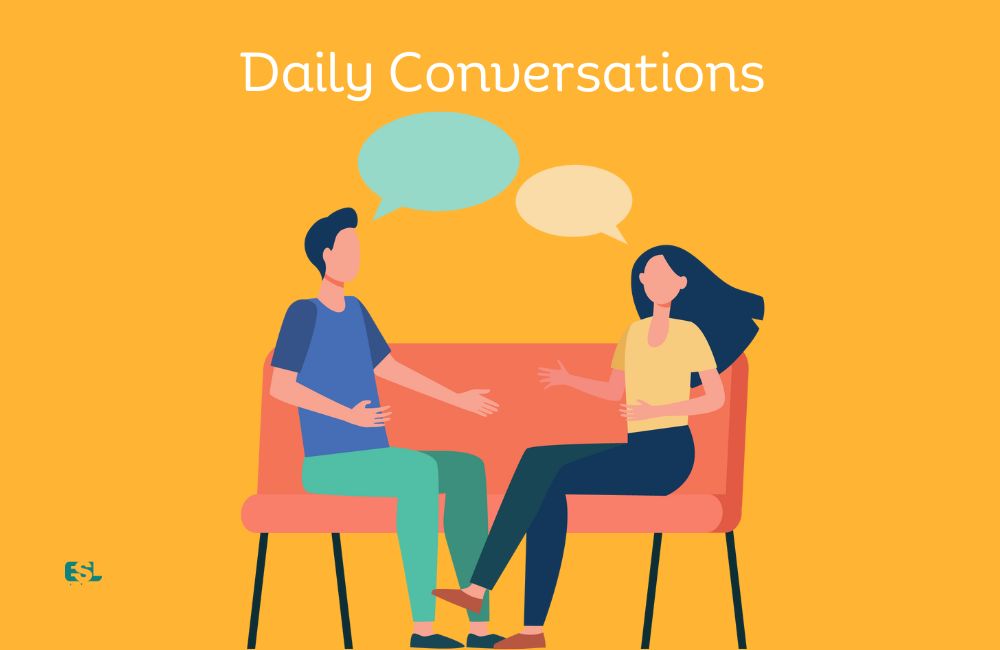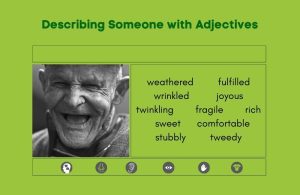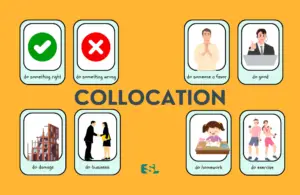The ability to communicate effectively is crucial in our daily interactions. The essence of communication lies in the words we use and how we use them. Whether you’re learning English as a second language or trying to improve your vocabulary as a native speaker, understanding essential words for daily conversations can be quite helpful.
This article outlines some critical words and phrases, categorized under various topics, that can help you navigate daily conversations more confidently and effectively.
Table of Contents
- 1. Greetings
- 2. Courtesies
- 3. Farewells
- 4. Expressing Agreement and Disagreement
- 5. Asking Questions
- 6. Expressing Likes and Dislikes
- 7. Sharing Opinions
- Sample Conversation: Using Vocabulary to Improve Daily Conversations
- In Conclusion
- FAQ: Improving Daily Conversations by Mastering Vocabulary
1. Greetings
Greetings are the first words we exchange in a conversation. They are crucial as they set the tone for the rest of the conversation. Here are some of the most common greeting words and phrases:
| Word/Phrase | Usage | Example Sentence |
|---|---|---|
| Hello | A universal greeting used in English | “Hello, how are you?” |
| Good Morning | A greeting used in the morning | “Good morning, John!” |
| Good Afternoon | A greeting used in the afternoon | “Good afternoon, everyone.” |
| Good Evening | A greeting used in the evening | “Good evening, Mrs. Smith.” |
| Hi | An informal greeting | “Hi, nice to meet you.” |
| Hey | A casual greeting among friends | “Hey, what’s up?” |
| How are you? | Used to inquire about someone’s wellbeing | “How are you, Tom?” |
| What’s up? | A casual way to ask what someone is doing | “What’s up, Lisa?” |
| How’s it going? | An informal way to inquire about someone’s wellbeing | “How’s it going, Mike?” |
| Nice to meet you | Used when meeting someone for the first time | “Nice to meet you, Jane.” |
| How have you been? | To ask about someone’s wellbeing, especially if you haven’t seen them for a while | “How have you been, Ben?” |
To improve your vocabulary in just 30 days, I recommend to my students an informative, fun, and accessible guide to utilizing powerful language. Millions of individuals have enhanced their academics, job skills, and confidence by dedicating just fifteen minutes daily to the exercises and tests of 30 Days to a More Powerful Vocabulary (Amazon Link), a top-selling. It offers step-by-step methods to bolster language prowess, discover compelling words, and daily vocabulary enhancement with pronunciation guidance.
2. Courtesies
Courtesy words are expressions that show respect, politeness, and goodwill to others. They’re small but powerful tools to maintain positive interactions. Here are some key courtesy words and phrases:
| Word/Phrase | Usage | Example Sentence |
|---|---|---|
| Thank you | Used to express gratitude | “Thank you for your help.” |
| Please | Used to make a polite request | “Please pass the salt.” |
| Sorry | Used to express regret or apologize | “I’m sorry for being late.” |
| Excuse me | Used to get someone’s attention or apologize for a minor offence | “Excuse me, is this seat taken?” |
| No problem | A casual way to respond when someone thanks you | “No problem, happy to help.” |
| You’re welcome | A more formal response to “thank you” | “You’re welcome, always happy to assist.” |
| Pardon | Used to express that you didn’t understand or hear something | “Pardon, could you repeat that?” |
| I appreciate it | A way to express gratitude | “I appreciate your help.” |
| Could you…? | Used to make a polite request | “Could you open the window, please?” |
| May I…? | Used to ask for permission | “May I use your pen?” |
| I’m afraid… | Used to politely express disagreement or refusal | “I’m afraid I can’t come to the party.” |
3. Farewells
Farewells are as essential as greetings. They mark the end of a conversation and can leave a lasting impression. Here are some common farewell words and phrases:
| Word/Phrase | Usage | Example Sentence |
|---|---|---|
| Goodbye | Used to express good wishes when parting or at the end of a conversation | “Goodbye, see you tomorrow!” |
| Good night | A parting phrase used in the evening or before going to bed | “Good night, sleep tight.” |
| See you later | A casual way to say goodbye, implying you will see the person again | “See you later, have a good day!” |
| Take care | A common farewell wishing someone well | “Take care, I’ll see you soon!” |
| Safe travels | Used when someone is leaving for a journey | “Safe travels, enjoy your trip!” |
| Farewell | A formal way of saying goodbye | “Farewell, until we meet again.” |
| Until next time | Used when you plan to see the person again in the future | “Until next time, keep in touch!” |
| Have a good day | A friendly farewell wishing someone a good day | “Have a good day, Bob!” |
| Catch you later | A casual way of saying goodbye, usually among friends | “Catch you later, dude!” |
| All the best | Used to wish someone well for the future | “All the best with your new job!” |
| Take it easy | A relaxed way of saying goodbye | “Take it easy, see you soon!” |
4. Expressing Agreement and Disagreement
In a conversation, it’s vital to effectively express agreement or disagreement. This helps maintain a meaningful conversation. Here are some words and phrases you can use:
| Word/Phrase | Usage | Example Sentence |
|---|---|---|
| Yes | A basic way to express agreement | “Yes, I think you’re right.” |
| No | A basic way to express disagreement | “No, I don’t think that’s correct.” |
| Absolutely | A strong way to express agreement | “Absolutely, I couldn’t agree more.” |
| Exactly | Used to completely agree with what someone has said | “Exactly, that’s just what I was thinking.” |
| I agree | A polite way to express agreement | “I agree with your point.” |
| I disagree | A polite way to express disagreement | “I disagree, I think it’s quite important.” |
| Maybe | Used when you are not sure if you agree or disagree | “Maybe, but I need to think about it.” |
| That’s true | Used to express agreement with a fact | “That’s true, it has been a warm winter.” |
| I’m not sure | Used when you need more information before agreeing or disagreeing | “I’m not sure, could you explain more?” |
| I don’t think so | A polite way to disagree | “I don’t think so, there might be a better way.” |
| I see your point, but… | Used to acknowledge the other person’s view while disagreeing | “I see your point, but I think there are other factors to consider.” |
5. Asking Questions
Questions are the backbone of a conversation. They allow you to obtain information, keep the conversation going, and show your interest in the other person. Here are some key question-related phrases:
| Word/Phrase | Usage | Example Sentence |
|---|---|---|
| What? | Used to ask for information | “What is your name?” |
| Where? | Used to ask about a place or position | “Where do you live?” |
| When? | Used to ask about time | “When is your birthday?” |
| Why? | Used to ask for a reason or purpose | “Why did you choose this career?” |
| How? | Used to ask about manner or condition | “How do you like your coffee?” |
| Who? | Used to ask about people | “Who is your best friend?” |
| Which? | Used when a choice needs to be made | “Which color do you prefer, red or blue?” |
| Could you tell me…? | A polite way to ask for information | “Could you tell me where the library is?” |
| Can you explain…? | Used when asking for detailed information or clarification | “Can you explain how this machine works?” |
| Do you know…? | Used to ask someone if they have specific knowledge | “Do you know when the train leaves?” |
| What do you think about…? | Used to ask for someone’s opinion | “What do you think about the new policy?” |
6. Expressing Likes and Dislikes
Sharing your preferences is a big part of everyday conversation. Here’s how you can express your likes and dislikes:
| Word/Phrase | Usage | Example Sentence |
|---|---|---|
| I love… | A strong way to express a like | “I love this song.” |
| I like… | A way to express a preference | “I like ice cream.” |
| I enjoy… | A way to express pleasure in an activity | “I enjoy reading books.” |
| I can’t stand… | A strong way to express a dislike | “I can’t stand loud noises.” |
| I don’t like… | A way to express a dislike | “I don’t like spinach.” |
| I hate… | A strong way to express a dislike | “I hate waking up early.” |
| I’m a fan of… | A way to express a strong preference | “I’m a fan of soccer.” |
| I’m not really into… | A polite way to express a dislike | “I’m not really into video games.” |
| I prefer… | A way to express a stronger like for one thing over another | “I prefer tea over coffee.” |
| I’m crazy about… | A very strong way to express a like | “I’m crazy about chocolate.” |
| I’m not a fan of… | A polite way to express a dislike | “I’m not a fan of horror movies.” |
7. Sharing Opinions
Part of having a conversation is sharing your thoughts and ideas. Here’s how you can share your opinions:
| Word/Phrase | Usage | Example Sentence |
|---|---|---|
| I think… | A way to express your thoughts | “I think the movie was excellent.” |
| In my opinion… | A formal way to express your views | “In my opinion, education is very important.” |
| As far as I’m concerned… | A way to share your personal view | “As far as I’m concerned, health is more important than wealth.” |
| I believe… | A strong way to express your belief | “I believe in honesty.” |
| If you ask me… | A way to share your opinion | “If you ask me, the book is better than the movie.” |
| Personally, I think… | A way to share your personal perspective | “Personally, I think it’s a great idea.” |
| I would say… | A way to share your thoughts in a polite way | “I would say that’s a fair point.” |
| It seems to me that… | A polite way to share your impression | “It seems to me that he’s a very talented musician.” |
| The way I see it… | A way to share your personal view | “The way I see it, we have two options.” |
| From my point of view… | A formal way to share your perspective | “From my point of view, the project was a success.” |
| I reckon… | An informal way to share your opinion | “I reckon it’s going to rain today.” |
If you are looking for an effective English language vocabulary builder, try Word Power Made Easy: The Complete Handbook for Building a Superior Vocabulary (Amazon Link). This time-tested classic has helped millions achieve mastery of English and improve their communication skills in business, the classroom, and in life.
Sample Conversation: Using Vocabulary to Improve Daily Conversations
Situation: At a community center, two friends, Mia and Lucas, discuss the value of enhancing their vocabulary for better communication.
Mia: Lucas, I’ve been delving into this book on communication skills, and it underscores the importance of a robust vocabulary in articulating thoughts more precisely.
Lucas: I concur, Mia. Employing varied and precise words can drastically augment the clarity and depth of our conversations. It’s not just about sounding smart; it’s about being understood better.
Mia: Absolutely. For instance, instead of overusing the word “happy,” we can express nuances with terms like “elated,” “content,” or “ecstatic.”
Lucas: Right, and it’s not just about emotions. In debates or discussions, using specific words can make your argument more cogent and compelling.
Mia: True. And in personal relationships, being able to convey feelings and thoughts accurately can foster better understanding and empathy. Words have the power to bridge gaps.
Lucas: They certainly do. I reckon that continually learning and incorporating new words into our daily lexicon can be a game-changer. It’s like expanding our toolkit for life.
In Conclusion
Mastering these essential words and phrases for daily conversation will improve your overall communication skills and enhance your ability to express yourself more clearly and effectively. Whether you’re using these phrases in a professional setting or incorporating them into casual conversation, they are vital tools for enriching your linguistic capability.
Remember, becoming comfortable with these words and phrases takes time and practice. Keep using them in your daily conversations, and they will gradually become second nature to you.
FAQ: Improving Daily Conversations by Mastering Vocabulary
1. Why is vocabulary essential in daily conversations?
A rich vocabulary allows for clearer expression of thoughts, emotions, and ideas. It enables individuals to convey messages with greater precision and nuance, leading to more meaningful and effective communication.
2. How can expanding one’s vocabulary enhance relationships?
By articulating feelings and thoughts more accurately, individuals can foster better understanding, reduce misunderstandings, and strengthen bonds in personal and professional relationships.
3. What’s the difference between “happy” and “elated”?
While both indicate a positive emotion, “happy” is a general term for feeling pleased or content. In contrast, “elated” suggests a higher intensity, often resulting from a specific event or achievement.
4. How can one effectively incorporate new words into daily conversations?
Start by learning a few new words each week, understanding their meanings, and using them in sentences. Over time, with consistent practice, these words will become a natural part of one’s vocabulary.
5. Are there tools or apps to help improve vocabulary?
Yes, there are numerous apps and websites, such as Vocabulary.com, Anki, or Memrise, designed to help individuals learn and practice new words.
6. How does reading benefit vocabulary expansion?
Regular reading, especially diverse genres and materials, exposes individuals to new words and contexts, naturally enhancing their vocabulary.
7. Is it essential to know the nuances between similar words?
Understanding nuances allows for more accurate and effective communication. It helps in differentiating subtle differences in meaning, tone, or emotion.
8. Can a vast vocabulary benefit professional life?
Absolutely. In professional settings, clear and articulate communication can lead to better collaboration, presentations, and impressions, potentially aiding career growth.
9. How can one remember and retain new words effectively?
Using mnemonic devices, associating words with images or stories, and regularly practicing them in conversations can aid retention.
10. Is it possible to overdo vocabulary enhancement?
While having a rich vocabulary is beneficial, it’s essential to be genuine and avoid using complex words unnecessarily. The goal is clear communication, not to perplex the listener.






